How To Get Rid Of Body Odor: 18 Natural Remedies That Work
The first step is to combat microbes; luckily, you can do that with a few handy tips.

Image: Shutterstock
If you want to ditch deodorants and are looking for tips on how to get rid of body odor, especially a natural body odor eliminator, you have come to the right place. While sweating is your body’s way of cooling down and letting some toxins out, the body odor that comes from it is uncool.

Body odor can arise from any part of the body and affect anyone despite their age. Understanding body odor is key to managing it effectively. Personal hygiene, diet, and underlying health conditions can all impact the way our bodies smell. While brands sell beautiful deodorants with amazing fragrances, their use of harmful chemicals has made people switch to healthier alternatives.
In this article, we explore some of the natural remedies you use to get rid of that foul body odor. Check them out below!
In This Article
What Is Body Odor?
The human body produces a wide range of natural smells called odorants that help regulate various bodily functions. While most body odors do not smell, sweat mixed with bacteria may cause an unpleasant body odor. Body odor can smell sweet, tangy, or sour.
However, the amount you sweat does not impact your body odor. Some people may sweat a lot but may have no body odor, while others who do not sweat a lot may give off an unpleasant body odor. Let us take a look at some of the symptoms associated with body odor.
Key Takeaways
- Your body produces different types of odors that help regulate bodily functions.
- Stress, anxiety, diabetes, or hormonal fluctuations may cause changes in body odors.
- You can use ingredients like parsley, lemon juice, or baking soda to control body odor. Medications or Botox are some of the medical treatments that may reduce body odor.
- Showering daily, drying your clothes properly, and eating a healthy diet can reduce your chances of developing body odor.
Symptoms Of Body Odor
While body odor can come from any part of the body, it most commonly occurs in the following areas:
- Armpits
- Feet
- Arms
- Behind the ears
- Genitals
- Belly button
- Groin
- Mouth
You may also develop a foul odor in your genital discharge, ear wax, urine, or stool. If the body odor is caused by an infection, it may be accompanied by the following symptoms:
- Rash
- Redness
- Discharge or ooziness
- Itching
Now that we know the different symptoms of body odor you need to look out for, let us understand what causes us this smell in the first place.
What Causes Body Odor?
Body odor is produced when the bacteria that live on our skin break down the proteins in our sweat into different acids.
Some people tend to think that it is the growth of bacteria on the skin that produces body odor, but in reality, it is this process that produces the unpleasant odor (1).
Every individual has a unique odor, which is influenced by parameters like age, diet, health, and gender (2).
The bacterial breakdown of the proteins in our sweat results in two acids – propionic acid and isovaleric acid.
Propionic acid is produced when propionibacteria break down amino acids. It has a pungent smell and is often associated with vinegar (3).
Isovaleric acid is also found in many kinds of cheese. It is produced by Staphylococcus epidermidis bacteria (4).
The human body also has two types of sweat glands that are present all over our body. They are:
- Eccrine Glands: These glands are found throughout the body. The sweat produced by the eccrine glands reaches the surface of the skin via certain ducts. They are usually responsible for maintaining our body temperature (5).
- Apocrine Glands: These glands are usually responsible for the foul odor produced by our body. The apocrine glands are usually found in our armpits, eyelids, genital area, and breasts. They are responsible for the secretion of fat droplets in breast milk and the production of earwax in the ears. In the armpits and groin, these glands usually give off an odor and are therefore known as scent glands (6).
Though body odor is a natural phenomenon, it can affect our confidence and personality. Let us learn more about the different medical conditions that may cause body odor.
What Diseases Can Cause Body Odor?
Changes in body odor are normal and may happen due to multiple factors. It could be due to changes in your lifestyle or the sign of an underlying medical condition.
- Stress And Anxiety
Stress and anxiety may play a role in causing you to sweat more, which may result in stronger body odor.
While hyperhidrosis (excessive sweating) may not cause health complications, it may cause a person social distress and result in low self-confidence (7).
- Diabetes
Diabetes is characterized by inadequate insulin secretion, which may lead to increased levels of acetone in the body.
This may result in a sweet smell from the mouth (8).
- Infectious Diseases
Certain strains of microbes may result in strong and distinct body odors. Digestive and upper respiratory infections and bacterial vaginosisi Inflammation of the vagina caused by the overgrowth of bacteria that may lead to itchiness and vaginal discharge. may cause a strong and sweet smell in the stool, breath, or vaginal discharge (8).
- Cancer
Cancer or tumors may show a change in certain metabolic activities, which may result in the secretion of volatile compounds. These volatile compounds, like alkane and benzene derivatives, may result in a strong and distinct body odor (8).
- Hormonal Changes
The hormonal fluctuations women experience during puberty, menstrual cycle, pregnancy, and menopause may cause significant changes in their body odor. Changes in hormones like cortisol, progesterone, estrogen, and testosterone levels in women have been associated with different body odors (8).
 Trivia
TriviaDifferent medical diseases may cause different characteristic odors. Seeing a medical professional can help you understand the cause behind your body odor and get the right treatment. Learn more about getting a medical diagnosis for body odor in the next section.
Diagnosis
Your doctor will conduct a medical examination and take your medical history to understand the cause behind your body odor. For further examination, they may ask you to get some blood and urine tests done to determine the exact cause. Upon diagnosing the cause of your body odor, they will prescribe the appropriate treatment for you.
Now, check out 18 home remedies to get rid of this pesky problem.
How To Get Rid Of Body Odor
- Oils
- Apple Cider Vinegar
- Epsom Salt
- Fenugreek Tea
- Fennel
- Green Tea
- Tea Bags
- Baking Soda
- Lemon Juice
- Tomato Juice Bath
- Milk Of Magnesia
- Rose Water
- Rubbing Alcohol
- Witch Hazel
- Neem Leaves
- Arrowroot
- Parsley
- Cornstarch
- Turmeric
Home Remedies For Body Odor
1. Oils
Some oils are known to have various properties that help combat body odor (9). A combination of these oils is also often used to address this issue. The best oils for body odor include:
a. Coconut Oil
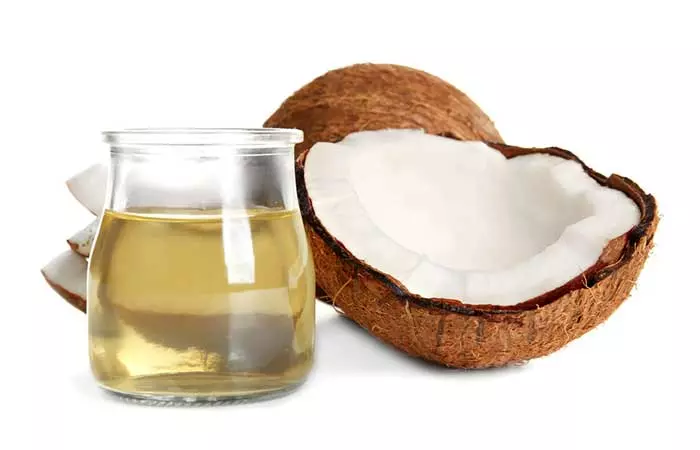
You Will Need
- Coconut oil
- 1 teaspoon of citric acid powder
- 1 cup of water
What You Have To Do
- Rub a small amount of coconut oil directly on the sweat-prone areas of your body.
- For foul body odor, mix the citric acid powder with water and use it as the last rinse before you step out of the shower. Concentrate on the armpits and the groin area.
- Towel dry your body and apply coconut oil.
How Often You Need To Do This
This can be done daily.
Why This Works
Coconut oil is rich in lauric acid, which is known to eliminate the bacteria present in our body, thus helping in getting rid of body odor.
b. Tea Tree Oil
You Will Need
- 2 teaspoons of tea tree oil
- 2 tablespoons of water
What You Have To Do
- Dilute the tea tree oil with water.
- Dab the mixture directly on your underarms and other areas.
How Often You Need To Do This
Follow this regimen daily for best results.
Why This Works
Tea tree oil can be used to get rid of underarm odor, as it is a natural antiseptic and has antibacterial properties (10). Being an antiseptic, tea tree oil can help in warding off the bacteria and fungus present on the skin that, in turn, prevents the occurrence of foul odor.
c. Lavender Oil
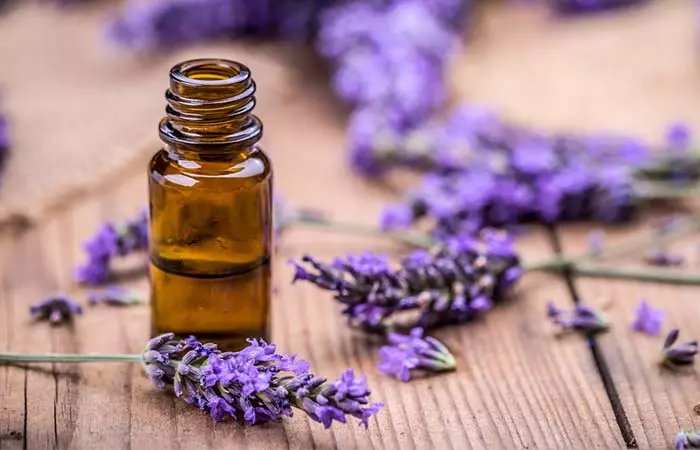
You Will Need
- 10 drops of lavender essential oil
- 3 teaspoons of cornstarch
- 2 teaspoons of baking soda
What You Have To Do
- Mix lavender essential oil with the cornstarch and baking soda.
- Store the mixture in a dark place for a couple of days.
- Apply this mixture as and when needed.
How Often You Need To Do This
This is a natural deodorant powder and can be used daily.
Why This Works
Lavender essential oil inhibits the growth of the odor-causing bacteria (11). And the floral essence it emanates is a bonus! Cornstarch and baking soda keep the skin dry, thereby preventing the accumulation of bacteria.
d. Peppermint Oil
You Will Need
- 10 drops of peppermint oil
- Water
- 4 tablespoons of coconut or jojoba oil
- 4 tablespoons of cornstarch
- 4 tablespoons of baking soda
What You Have To Do
- You can either apply a few drops of peppermint oil directly or mix with water and spray onto your underarms.
- If you wish to keep your underarms dry, you need to mix peppermint oil, coconut/jojoba oil, cornstarch, and baking soda. Refrigerate this mixture and use as needed.
How Often You Need To Do This
This mixture can be applied on a daily basis.
Why This Works
Peppermint has antibacterial properties and can, therefore, be used as an alternative to store-bought deodorants. A 2013 study published in European Journal of Dentistry evaluated the antimicrobial efficacy of five essential oils, namely tea tree, lavender, thyme, peppermint, and eugenol oil, against oral pathogens using the broth dilution method. The study determined that eugenol, peppermint, and tea tree oil exhibited the most significant inhibitory effects, with mean MIC values of 0.62, 9.00, and 17.12 μg/mL, respectively. E. faecalis showed the lowest sensitivity to all essential oils (12). Coconut oil is also antibacterial and helps in killing the bacteria present on the skin. Cornstarch and baking soda keep the skin dry and sweat-free.
e. Tamanu Oil

You Will Need
- Tamanu essential oil
- Lavender oil OR tea tree oil OR peppermint oil
What You Have To Do
Apply a few drops of tamanu oil directly to the problem area or mix it with any of the essential oils mentioned above and apply on your skin.
How Often You Need To Do This
This oil is safe for daily application and can be used as per your requirement.
Why This Works
Tamanu oil has a deep scent and is known for its anti-inflammatory, antibacterial, antifungal, and antimicrobial properties that can help combat body odor (13).
f. Sage Oil
You Will Need
- Sage essential oil
- Water
What You Have To Do
- Sage oil can be diluted with water and sprayed directly onto your skin.
- You can also soak dry sage in hot water and use this water on the sweat-prone areas of your body. However, this oil should not be used on sensitive areas of the body.
How Often You Need To Do This
This remedy can be used on a regular basis.
Why This Works
The antibacterial nature of sage helps to combat the bacteria present on the skin while leaving a pleasant fragrance behind (14).
2. Apple Cider Vinegar
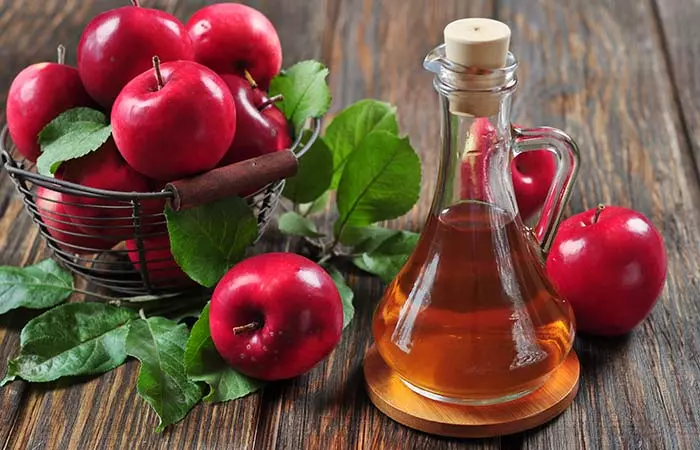
What You Need
- Apple cider vinegar
- Cotton balls
- Water (optional)
What You Have To Do
- Apple cider vinegar can be directly applied to your underarms and other body parts using a cotton ball.
- Alternatively, half a cup of ACV can be mixed with one cup of water and used as a deodorant.
How Often You Need To Do This
As this is a natural alternative to store-bought deodorants, it can be used on a regular basis as per one’s requirement.
Why This Works
Being acidic in nature, apple cider vinegar is known for its ability to kill and prevent bacterial formation, which can, in turn, prevent the occurrence of foul body odor (15).
3. Epsom Salt
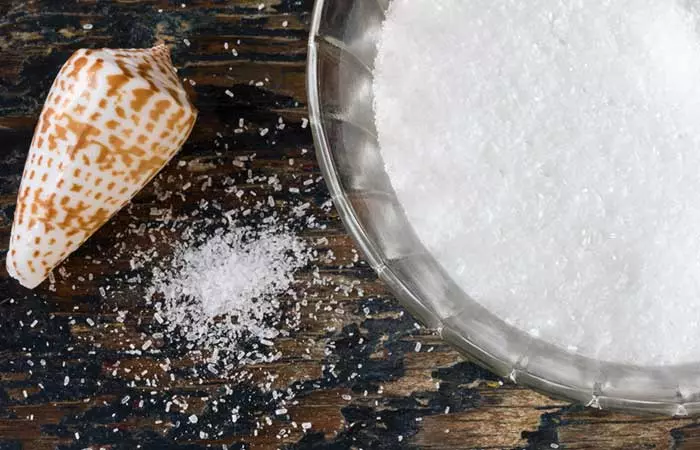
What You Need
- Epsom salt
- Hot water
What You Have To Do
- Fill a bathtub or jacuzzi with hot water and pour about 2 to 3 cups of Epsom salt into it.
- Soak in the bath and relax.
How Often You Need To Do This
You can try this treatment 3 times a week for best results.
Why This Works
Epsom salt is an antioxidant and is known to detoxify our body. It also helps our body produce a hormone called serotonini A chemical messenger that may help stabilize one's mood by carrying signals between the nerve cells in the brain and the body. , which helps it to relax. These properties of Epsom salt relieve stress and this, in turn, decreases sweat production, thereby eliminating foul odor from our body.
4. Fenugreek Tea
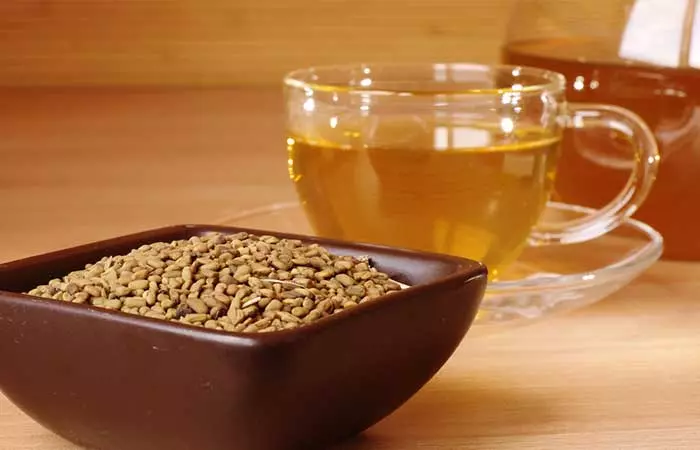
What You Need
- 1 teaspoon of fenugreek seeds
- 250 ml of water
What You Have To Do
- Add the fenugreek seeds to water and bring it to a boil till the quantity of water reduces to half.
- Drink this on an empty stomach every morning.
How Often You Need To Do This
You can continue drinking this every morning to detoxify your body.
Why This Works
Being an antioxidant, fenugreek flushes out all the toxins from our body. It also possesses antibacterial properties and inhibits any bacterial infection from spreading further (16). Fenugreek tea is thus believed to fight body odor naturally by treating its root cause.
5. Fennel Seeds
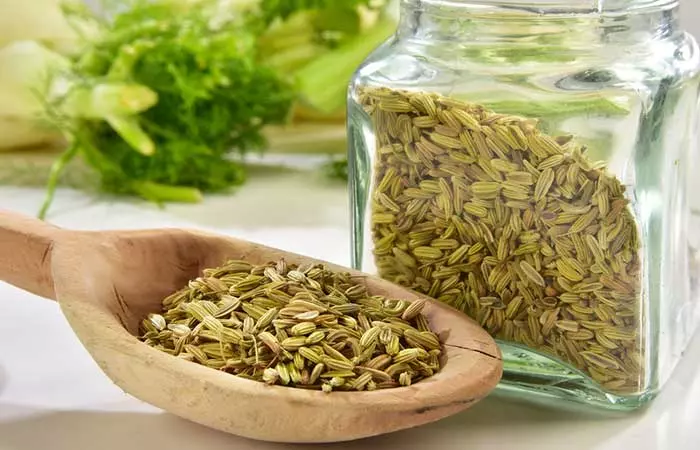
What You Need
- 1 teaspoon of crushed fennel seeds
- 1 cup of water
- Honey (optional)
What You Have To Do
- Add the crushed fennel seeds to a cup of water and allow the mixture to boil.
- Strain the mixture.
- If required, add some honey for flavor.
How Often You Need To Do This
Consume it every morning until you get the desired result.
Why This Works
Some of the components present in fennel seeds are stimulants and promote the secretion of digestive and gastric juices in the stomach. They are also known to act as laxatives and can prevent body odor (17).
6. Green Tea
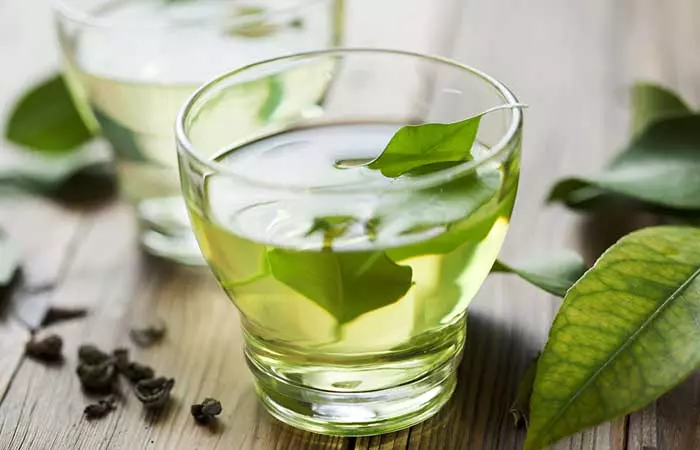
What You Need
- Green tea leaves
- Water
What You Have To Do
- Boil enough water in a teapot and add the green tea leaves.
- Allow it to cool and then apply the strained extract to the sweat-prone areas of the body.
- Regular intake of green tea on an empty stomach can also help you deal with foul body odor.
How Often You Need To Do This
Apply this mixture on alternate days as daily application could be too drying for some skin types.
Why This Works
The antioxidants and tannic acid in green tea help combat body odor from within. A 2012 review published in Journal of Indian Society of Periodontology highlighted the health benefits of green tea, particularly for general health. Rich in flavonoids green tea contains epigallocatechin-3-gallate (EGCG), which plays a key role in its anticancer and antioxidant effects. Catechins, comparable to vitamins E and C, act as potent free radical scavengers. The review suggested that green tea supports health by reducing inflammation and limiting bacterial growth (18). While the external application of green tea helps to keep the skin dry and keeps the bacteria in check, daily intake of green tea helps to flush all the toxins out of the body.
7. Tea Bags

What You Need
- 4 tea bags
- 2L of water
What You Have To Do
- Bring the water to a boil and add the tea bags.
- Pour this tea into your regular bath and soak in it for 15-20 minutes.
How Often You Need To Do This
Do this at least thrice a week.
Why This Works
The tannins present in tea keep the skin dry, thereby preventing sweat formation (19).
8. Baking Soda
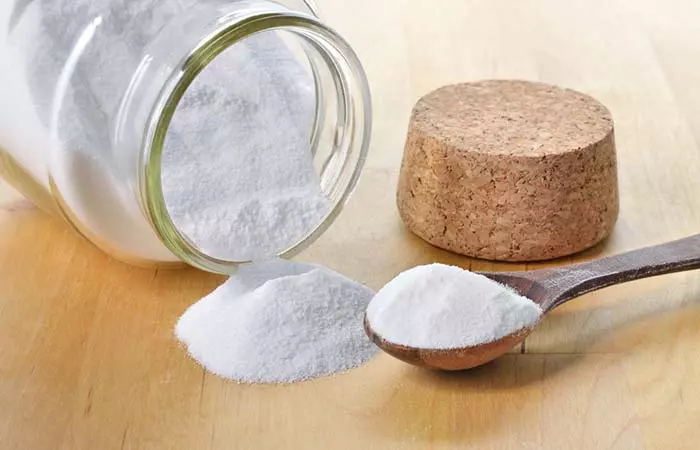
What You Need
- 1 tablespoon of baking soda
- Water (optional)
What You Have To Do
- Take the powdered baking soda in a bowl and brush it on all the sweat-prone areas of your body, such as your underarms.
- Dust off the extra powder and go about your day as usual.
- Alternatively, you can mix baking soda with a few drops of water to make a paste.
- Apply this paste to the underarms and other areas of your body.
- Leave it on for 10-15 minutes and wash off with lukewarm water. Pat dry with a towel.
How Often You Need To Do This
Do this daily for a few weeks.
Why This Works
Baking soda absorbs moisture, and hence, it prevents the formation of sweat. It not only kills the bacteria on the skin but also alkalizes the body and neutralizes the pungent odor that our body gives off (19).
9. Lemon Juice

What You Need
- 1 lemon
- Water
What You Have To Do
- Cut the lemon into two halves and rub it directly on your underarms.
- Allow it to dry completely. Wash off with lukewarm water.
- If you have sensitive skin, you can dilute lemon juice with a few drops of water and then apply it on the underarms.
How Often You Need To Do This
You can do this daily.
Why This Works
The acidic nature of lemon lowers the pH of our body, making it difficult for the bacteria to survive on our skin (20).
Sarah Tran, a vlogger, shared her experience of using lemons for 9 months to get rid of body odor in her personal video. She said, “When I use this method at the beginning of the day, I don’t stink at all for 24 hours (i).”
10. Tomato Juice

What You Need
- 2 cups of tomato juice
- 1 bucket of warm water
What You Have To Do
- Fill your bathtub with warm water and add the tomato juice to it.
- Soak in the bath and relax for 20 to 30 minutes.
How Often You Need To Do This
You can follow this procedure 3 to 4 times a week.
Why This Works
The acidic nature of tomatoes kills the bacteria present on the skin while its astringent properties minimize the pores and reduce sweat production (21).
11. Milk Of Magnesia
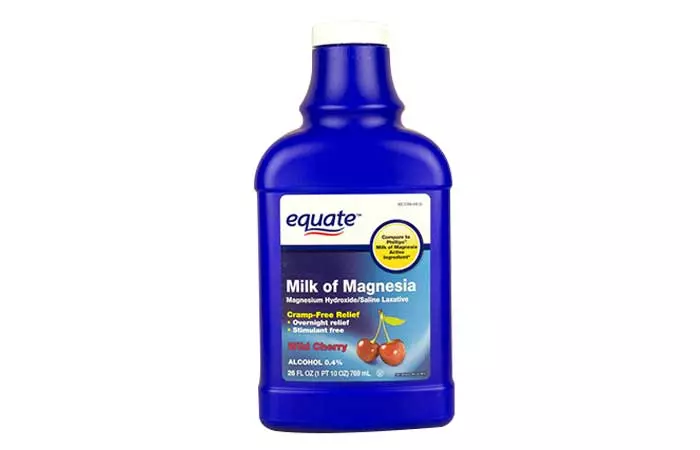
What You Need
- Milk of magnesia
- Any essential oil (optional)
What You Have To Do
- Dab some milk of magnesia directly on your underarms.
- You can also mix it with a few drops of any essential oil, store it in a bottle, and spray onto your skin whenever required.
How Often You Need To Do This
Do this every morning or night on a regular basis.
Why This Works
Milk of magnesia is actually magnesium hydroxide suspended in water. Being an antacid, it is known to counteract the production of acid, and hence, it can help combat body odor. Milk of magnesia is also known to leave the skin relatively dry and odor-free right from the first application.
12. Rose Water
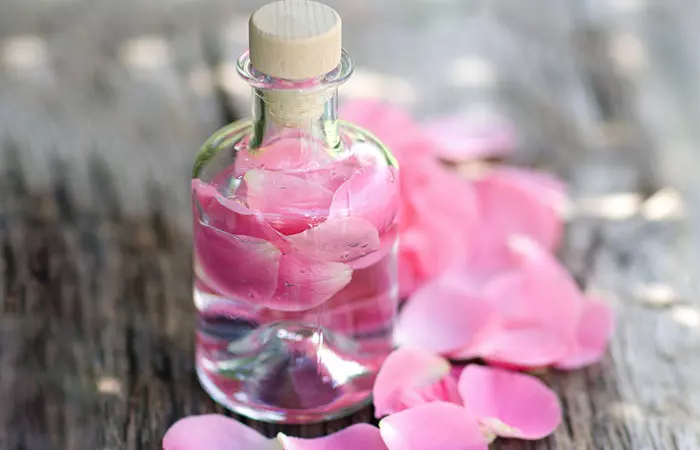
What You Need
- 3 tablespoons of rose water
- 1 tablespoon of apple cider vinegar
What You Have To Do
- Mix rose water with apple cider vinegar.
- Store this mixture in a bottle and spray on your underarms and other body parts whenever required.
How Often You Need To Do This
Apply this daily for best results.
Why This Works
As rose water is an astringent, it reduces the size of the pores present on the skin, and this decreases sweat production (22). It also leaves behind a floral fragrance.
13. Rubbing Alcohol
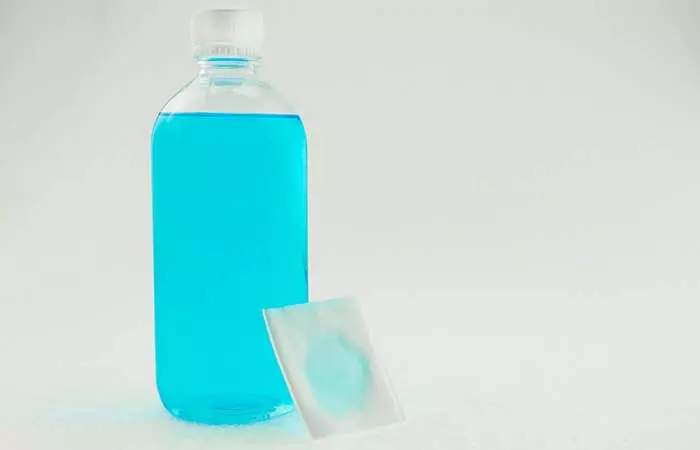
What You Need
- Rubbing alcohol
- Cotton pads
What You Have To Do
Take some drops of rubbing alcohol on a cotton pad and apply it to your underarms.
How Often You Need To Do This
This can be used on your underarms and other less sensitive body parts daily.
Why This Works
The antibacterial properties of rubbing alcohol eliminate all the surface bacteria present on the skin, and this prevents body odor (23).
14. Witch Hazel
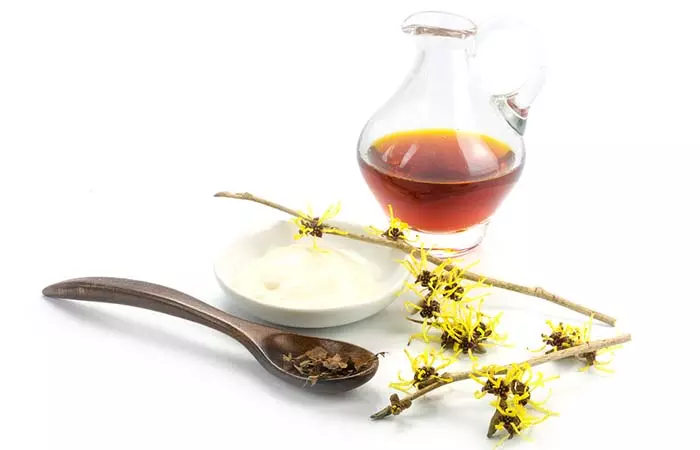
What You Need
- Witch hazel
- Cotton balls
What You Have To Do
Take a few drops of witch hazel on a cotton ball and dab it on your underarms and other sweat-prone areas of your body.
How Often You Need To Do This
You can use this on a daily basis as a substitute for your deodorant.
Why This Works
The astringent properties of witch hazel minimize the size of the pores on our skin, reducing the production of sweat to a great extent. Also, its acidic nature lowers the pH of the skin and makes the survival of the odor-causing bacteria impossible (24).
15. Neem Leaves
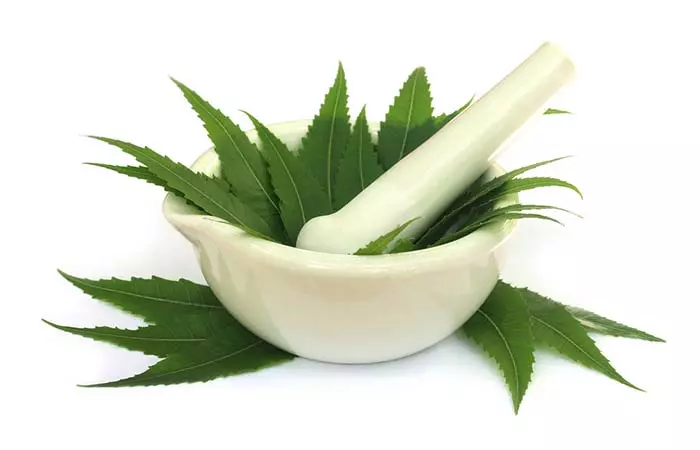
What You Need
- A handful of neem leaves
- 1 cup of water
What You Have To Do
- Grind the neem leaves to make a fine paste.
- Apply this paste on all the sweat-prone areas on your body.
- Allow it to dry and wash it off with warm water.
- Alternatively, boil some neem leaves in water. Strain the water and use it in your bath.
How Often You Need To Do This
Daily use is recommended for best results.
Why This Works
The antibacterial, antifungal, and antiseptic properties of neem help it to eliminate the odor-causing bacteria (25). It also removes all the toxins from within the body, eradicating the root cause of body odor.
16. Arrowroot
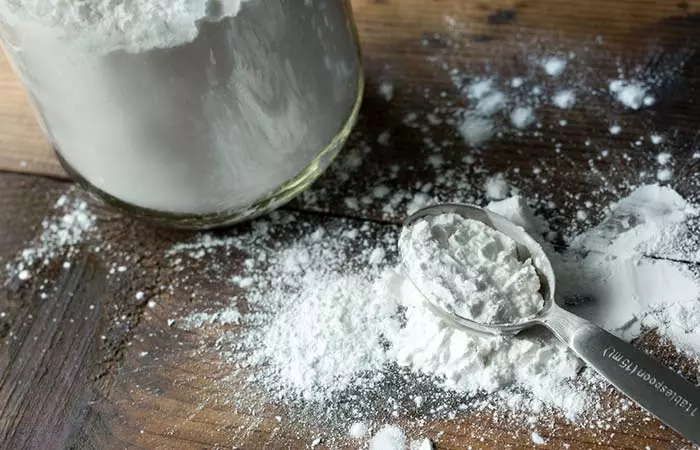
What You Need
Arrowroot powder
What You Have To Do
- Apply arrowroot powder directly on your underarms and other areas of your body that experience excessive perspiration.
- Leave it on for the rest of the day.
How Often You Need To Do This
Arrowroot powder can be used on a daily basis.
Why This Works
Arrowroot is known for its anti-inflammatory properties and is a commonly used herb to treat rashes in babies. It keeps the skin dry, which, in turn, keeps the bacterial formation at bay.
17. Parsley

What You Need
- A teaspoon of parsley leaves
- 1 cup of water
What You Have To Do
- Add the parsley leaves to water and boil for 5 minutes.
- Strain and drink the water.
How Often You Need To Do This
Drink parsley water regularly for best results.
Why This Works
Parsley leaves have been known to possess anti-odor properties since ages. The presence of chlorophyll in these leaves is said to eliminate body odor and bad breath internally (26).
18. Cornstarch
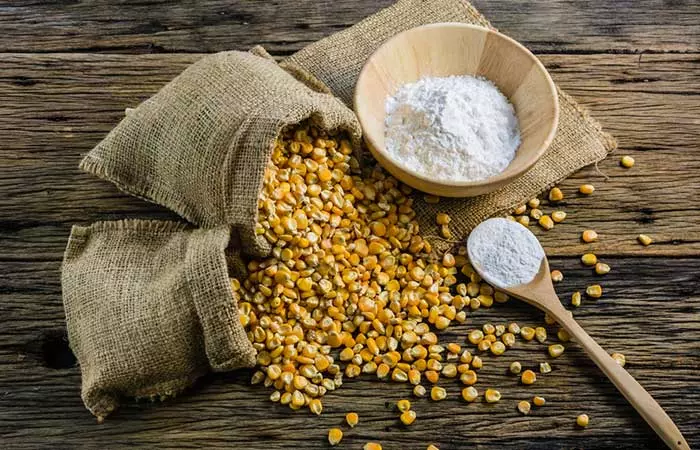
What You Need
Cornstarch powder
What You Have To Do
- Dust some cornstarch on your underarms and other sweaty areas of your body.
- Leave it on for the rest of the day.
How Often You Need To Do This
You can use this daily as a natural alternative to your deodorant.
Why This Works
The antibacterial properties of cornstarch help to keep the bacteria in check. Cornstarch also helps in keeping the skin dry, thereby decreasing the production of sweat.
19. Turmeric
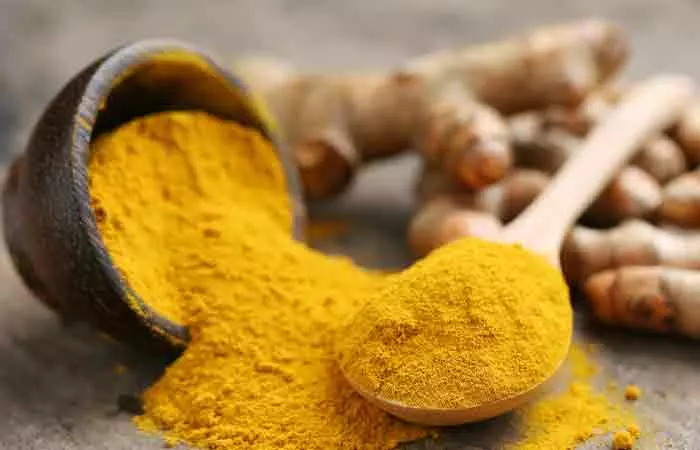
What You Will Need
- 1 tablespoon of turmeric powder
- Rosewater or plain water
What You Have To Do
- Mix the turmeric powder with a little bit of rosewater or plain water to form a thick paste.
- Gently apply the turmeric paste to your underarms and other sweaty areas of the body.
- Let the paste sit for 20-30 minutes.
- Rinse off the dried paste thoroughly with lukewarm water and ensure no residue remains on the skin.
How Often To Do It
You can use this remedy 2-3 times a week
Why This Works
The curcumin in turmeric exhibits antibacterial and antifungal properties that may help eliminate odor-causing bacteria and fungi. A 2025 study published in Pharmaceuticals (Basel) examined the antimicrobial properties of curcumin, the principal bioactive compound in turmeric (Curcuma longa L.), highlighting its antioxidant, anti-inflammatory, antibacterial, antifungal, and antiviral effects. The research assessed over 100 pathogen strains from 19 species using the broth microdilution method to determine the minimum inhibitory concentration (MIC). Results showed that Gram-positive bacteria were more sensitive to curcumin than Gram-negative ones, with notable effectiveness against Streptococcus pyogenes, methicillin-sensitive Staphylococcus aureus, and Acinetobacter lwoffii (27). This is also how you can get rid of vaginal odor. However, more research is needed in this regard.
When home remedies fail to give you visible results, you can consult your doctor for medical treatments.
Medical Treatment For Body Odor
- Medications: Prescription medications or antibiotics may be prescribed by your doctor to manage the sweat.
- Botulinum Toxin (Botox): Your doctor may recommend getting Botox injections to control sweating and body odor. A study found there was a significant decrease in body odor after a week of Botox treatment (28).
- Surgery: Your doctor may recommend endoscopic thoracic sympathectomy if all medical interventions fail. In this procedure, the doctor severs the nerves associated with sweat glands. Many patients report improved satisfaction and quality of life after the procedure (29).
In addition to these remedies, maintaining basic hygiene and bathing daily, shaving the hair in sweat-prone areas, wearing cotton clothes, and eating a healthy diet will help combat body odor at a faster pace. Some foods and drinks may worsen body odor. These include onions, alcohol, and spices, among other sulfur-containing foods (30). Avoiding these foods and increasing the intake of fruits and vegetables can help detoxify the body and enhance its smell. Here are a few tips to guide you.
Tips To Prevent Body Odor
- Try to stick to an all-natural and aluminum-free deodorant, antiperspirant, cologne or perfume.
- Shower daily.
- Spritz vinegar or rubbing alcohol on the sweat-prone areas.
- Take green supplements such as chlorophyll or wheatgrass to combat body odor internally.
- Wear clean clothing made of cotton so that your skin can breathe freely.
- Use a natural sanitizer such as tea tree oil to wipe the sweat-prone areas from time to time.
- Adopt a diet with less spicy food.
- Detoxify your body regularly by consuming fenugreek seeds and green tea.
 Quick Tip
Quick TipIn the next section, we take a look at when is the right time to visit a doctor. Keep reading.
When To See A Doctor
Consult your doctor if you experience any of the following symptoms:
- Excessive sweating at night while sleeping
- Cold sweats
- The body odor and sweating impact daily activities
- Skin infections
- Skin becoming wet with sweat
- Fruity or metallic body odor
Infographic: Foods That May Cause Body Odor
Body odor is natural and can emanate from any part of your body at any age. While deodorants can help get rid of the bad smell, you can also opt for some simple solutions like avoiding foods that aggravate this issue. We have compiled a list of foods that cause body odor. Check out the infographic below to know more!
Some thing wrong with infographic shortcode. please verify shortcode syntax
The Bottom Line
Not every lifestyle change or product is sustainable or safe, so you may want to opt for more natural options when learning about how to get rid of body odor. Contrary to popular belief, it is not bacterial growth that leads to body odor but instead the breakdown of proteins in sweat. Most natural remedies for body odor are intended to minimize bacterial growth to remedy the situation. Certain oils like coconut oil, tea tree oil, lavender oil, and peppermint oil can be used to combat bacterial overgrowth and body odor. You can also use apple cider vinegar, fenugreek seeds, green tea, Epsom salt, and more effective natural ingredients to check body odor.
Frequently Asked Questions
What are the best foods that eliminate body odor?
Some of the best foods that help in the elimination of body odor are parsley leaves, wheatgrass, fenugreek seeds, and green tea.
What foods cause body odor?
Sulfur-containing foods like cabbage, broccoli, garlic, and onions can cause body odor (8).
Is bad body odor genetic?
About one-third of the people who reported body odor issues were found to have a hereditary gene responsible for their condition. Trimethylaminuria is the genetic condition that produces foul body odor in affected individuals (31). However, altering one’s diet can help combat this condition.
How can you get body odor out of clothes?
In some cases, it becomes next to impossible to get rid of the foul body odor from the person’s clothes. No matter what you do, the stubborn odor just refuses to leave your clothing! In such situations, the following steps will help you easily overcome this issue.
• Gather the affected clothes and toss them into the washing machine
• Fill it with warm water
• Add about two cups of vinegar to the machine and set it to spin for 5 to 10 minutes
• Turn off the washing machine and soak the clothing in water for at least 4 hours
• Add a bleach-free detergent and turn the machine on
• Complete a wash cycle and remove the clothing from it immediately
• Dry the clothes in fresh air to get rid of any remaining foul odor
What soap is best for body odor?
You can buy medicated soaps and body washes recommended by a doctor. If you are looking for non-medicated soaps, you can buy ones with ingredients like charcoal or peppermint with antibacterial properties that can help fight body odor.
Why does body odor smell like onions?
Consumption of onions, garlic, and certain foods produces sulfur-like compounds. This may react with the sweat, giving a scent different from the person’s natural scent (8).
Can lack of adequate water intake cause body odor?
Yes, as water aids in the release of toxins through sweat. Additionally, if your body is dehydrated, you won’t be able to expel these toxins (bacteria), leading to their build up and an unpleasant body odor, particularly in the groin and armpits. This is also why people may have smelly feet.
Does caffeine cause body odor?
Body odor may be impacted by caffeine. Hot, caffeinated beverages can also make you sweat more and elevate your body temperature, all of which can increase body odor. However, further study is required to support this statement.
Can body odor be transmitted through clothes?
No, body odor is not contagious. It cannot be passed from one person to another through clothes.
Illustration: Home Remedies To Get Rid Of Body Odor And Tips To Follow
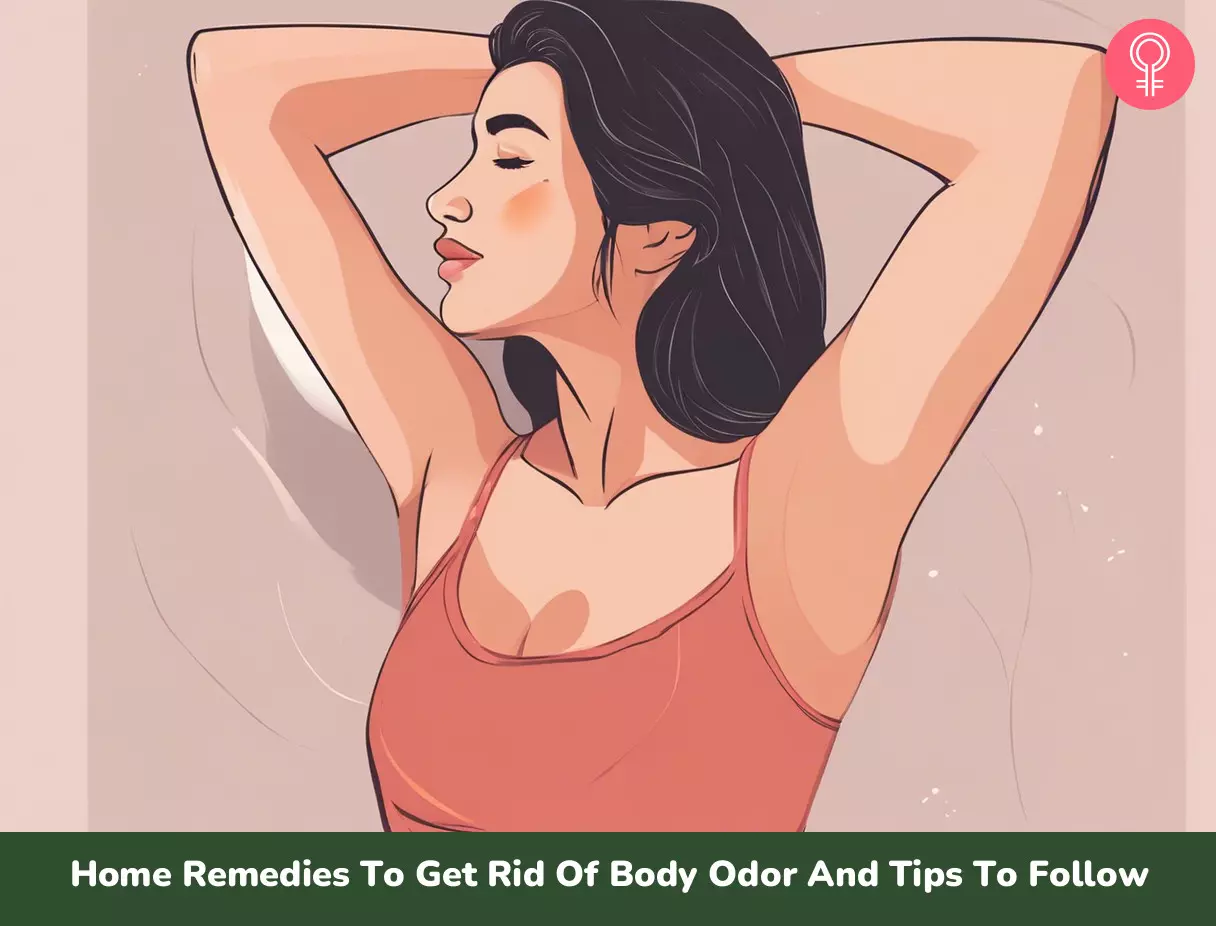
Image: Stable Diffusion/StyleCraze Design Team
Learn how to naturally get rid of body odor with easy DIY tips! Say goodbye to synthetic products and explore natural DIY remedies. Watch the video for ideas.
Personal Experience: Source
StyleCraze's articles are interwoven with authentic personal narratives that provide depth and resonance to our content. Below are the sources of the personal accounts referenced in this article.
i. DIY | Naturally Get Rid of Body Odor!https://www.youtube.com/watch?v=TdS7kOTv4pw
References
Articles on StyleCraze are backed by verified information from peer-reviewed and academic research papers, reputed organizations, research institutions, and medical associations to ensure accuracy and relevance. Read our editorial policy to learn more.
- Suppression of Microbial Metabolic Pathways Inhibits the Generation of the Human Body Odor Component Diacetyl by Staphylococcus spp
https://www.ncbi.nlm.nih.gov/pmc/articles/PMC4229079/ - Individual and gender fingerprints in human body odour
https://www.ncbi.nlm.nih.gov/pmc/articles/PMC2359862/ - Body Odor
https://microbewiki.kenyon.edu/index.php/Body_Odor - Scientists Find Chemical Clue To Body Odor
https://www.nytimes.com/1990/08/28/science/scientists-find-chemical-clue-to-body-odor.html?mcubz=0 - Eccrine sweat gland development and sweat secretion
https://pubmed.ncbi.nlm.nih.gov/26014472/ - Hyperhidrosis: A Review of Current Management
https://www.researchgate.net/publication/11288712_Hyperhidrosis_A_Review_of_Current_Management - Hyperhidrosis and Stress
https://link.springer.com/chapter/10.1007/978-3-319-46352-0_14 - Individual Variation in Body Odor
https://www.researchgate.net/publication/314134477_Individual_Variation_in_Body_Odor - Body malodours and their topical treatment agents
https://onlinelibrary.wiley.com/doi/pdf/10.1111/j.1468-2494.2011.00649.x - Melaleuca alternifolia (Tea Tree) Oil: a Review of Antimicrobial and Other Medicinal Properties
https://www.ncbi.nlm.nih.gov/pmc/articles/PMC1360273/ - Lavender and the Nervous System
https://www.ncbi.nlm.nih.gov/pmc/articles/PMC3612440/ - Antimicrobial efficacy of five essential oils against oral pathogens: An in vitro study
https://www.ncbi.nlm.nih.gov/pmc/articles/PMC4054083/ - Tamanu oil and skin active properties: From traditional to modern cosmetic uses
https://www.researchgate.net/publication/327719956_Tamanu_oil_and_skin_active_properties_From_traditional_to_modern_cosmetic_uses - The effect of clary sage oil on staphylococci responsible for wound infections
https://www.ncbi.nlm.nih.gov/pmc/articles/PMC4360007/ - The Effect of External Apple Vinegar Application on Varicosity Symptoms Pain and Social Appearance Anxiety: A Randomized Controlled Trial
https://www.ncbi.nlm.nih.gov/pmc/articles/PMC4735895/ - The Effects of Fenugreek on Radiation Induced Toxicity for Human Blood T-Cells in Radiotherapy
https://www.ncbi.nlm.nih.gov/pmc/articles/PMC4528356/ - Randomized clinical trial of a phytotherapic compound containing Pimpinella anisum Foeniculum vulgare Sambucus nigra and Cassia augustifolia for chronic constipation
https://www.ncbi.nlm.nih.gov/pmc/articles/PMC2874511/ - Green tea: A boon for periodontal and general health
https://www.ncbi.nlm.nih.gov/pmc/articles/PMC3459493/ - Antibacterial activity of baking soda
https://pubmed.ncbi.nlm.nih.gov/12017929/ - Quantitative Assessment of Citric Acid in Lemon Juice Lime Juice and Commercially-Available Fruit Juice Products
https://www.ncbi.nlm.nih.gov/pmc/articles/PMC2637791/ - Enhancing the Health-Promoting Effects of Tomato Fruit for Biofortified Food
https://www.ncbi.nlm.nih.gov/pmc/articles/PMC3972926/ - Formulation and physical characterization of herbal face gel toner
https://www.researchgate.net/publication/353584527_Formulation_and_physical_characterization_of_herbal_face_gel_toner - Antiseptics and Disinfectants: Activity Action and Resistance
https://www.ncbi.nlm.nih.gov/pmc/articles/PMC88911/ - Antioxidant and potential anti-inflammatory activity of extracts and formulations of white tea rose and witch hazel on primary human dermal fibroblast cells
https://www.ncbi.nlm.nih.gov/pmc/articles/PMC3214789/ - A potential of some medicinal plants as an antiulcer agents
https://www.ncbi.nlm.nih.gov/pmc/articles/PMC3249913/ - An Overview of the most important MedicinalPlants used as Mouth Freshener
https://www.jpsr.pharmainfo.in/Documents/Volumes/vol9Issue06/jpsr09061709.pdf - Curcumin, a Natural Antimicrobial Agent with Strain-Specific Activity
https://www.ncbi.nlm.nih.gov/pmc/articles/PMC7408453/ - Amelioration of Body Odor After Intracutaneous Axillary Injection of Botulinum Toxin A
https://jamanetwork.com/journals/jamadermatology/fullarticle/479132 - The quality of life and satisfaction rate of patients with upper limb hyperhidrosis before and after bilateral endoscopic thoracic sympathectomy
https://www.ncbi.nlm.nih.gov/pmc/articles/PMC6329233/ - Microbiota and Malodor—Etiology and Management
https://pmc.ncbi.nlm.nih.gov/articles/PMC7215946/ - A Review of Trimethylaminuria: (Fish Odor Syndrome)
https://www.ncbi.nlm.nih.gov/pmc/articles/PMC3848652/
Read full bio of Dr. Priya Gill
Read full bio of Esha Saxena
Read full bio of Ramona Sinha
Read full bio of Monomita Chakraborty







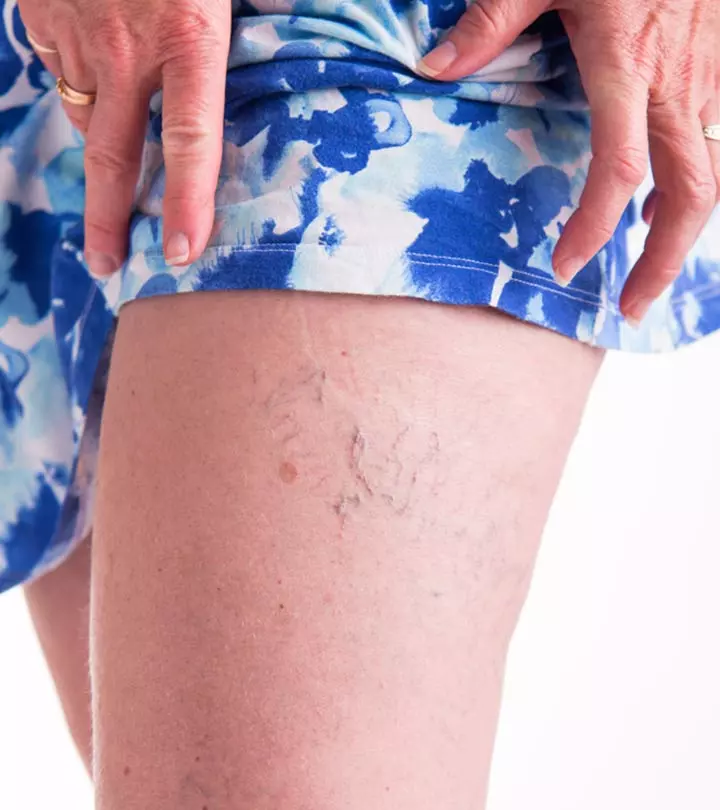



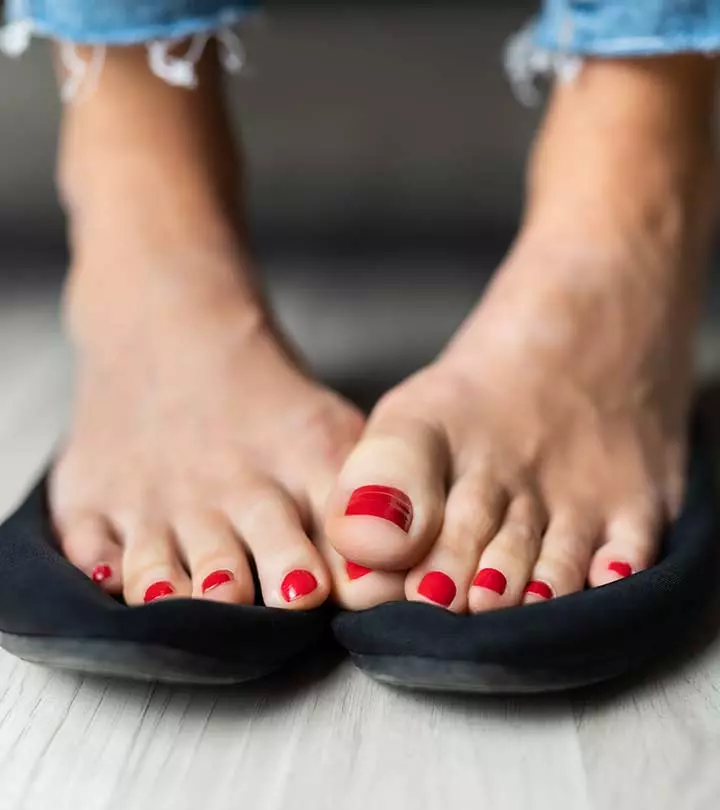

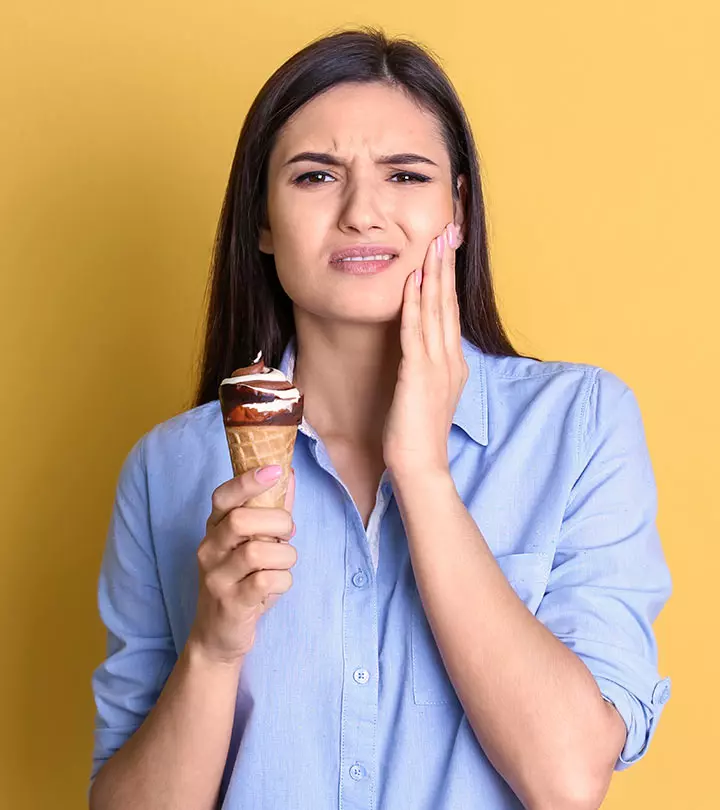

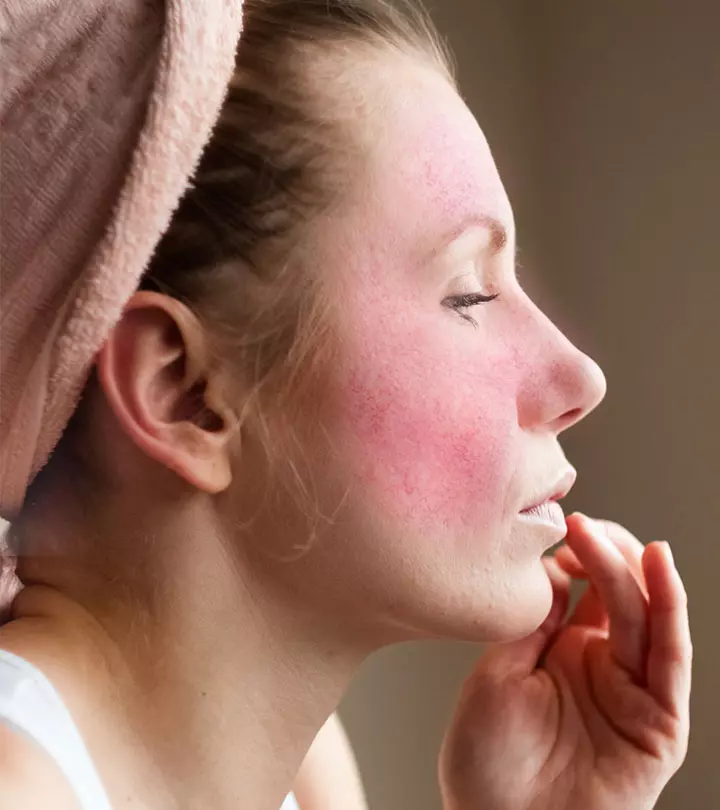
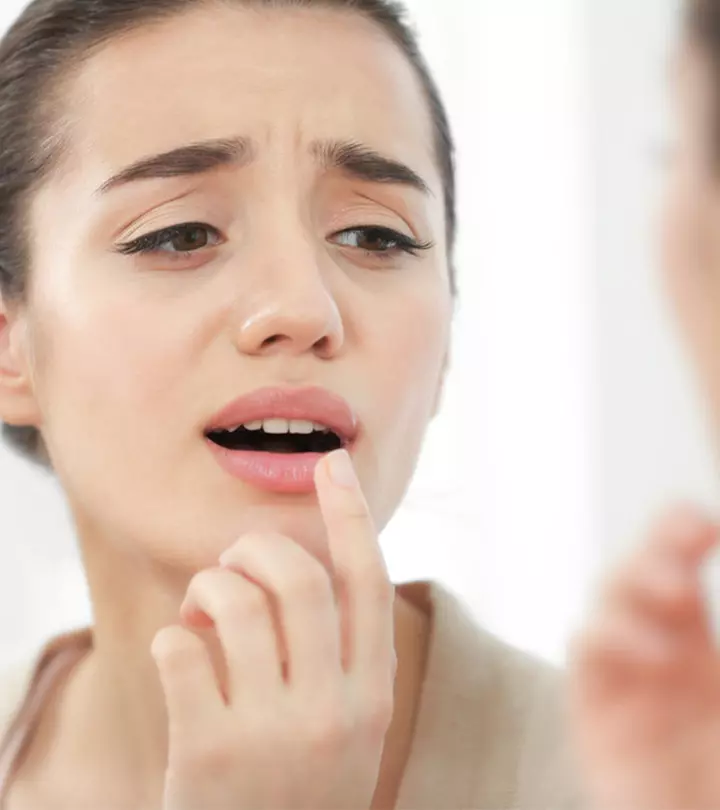
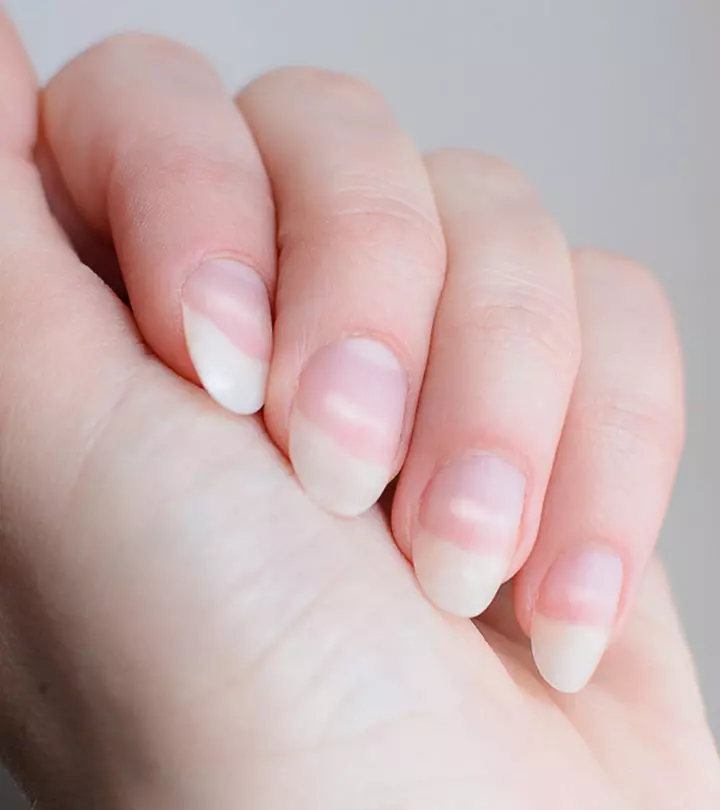


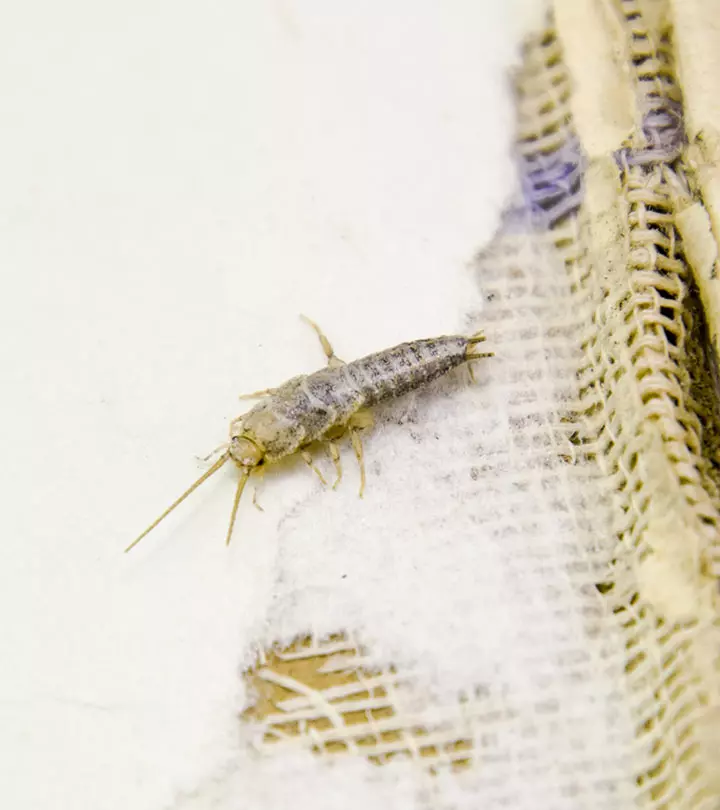
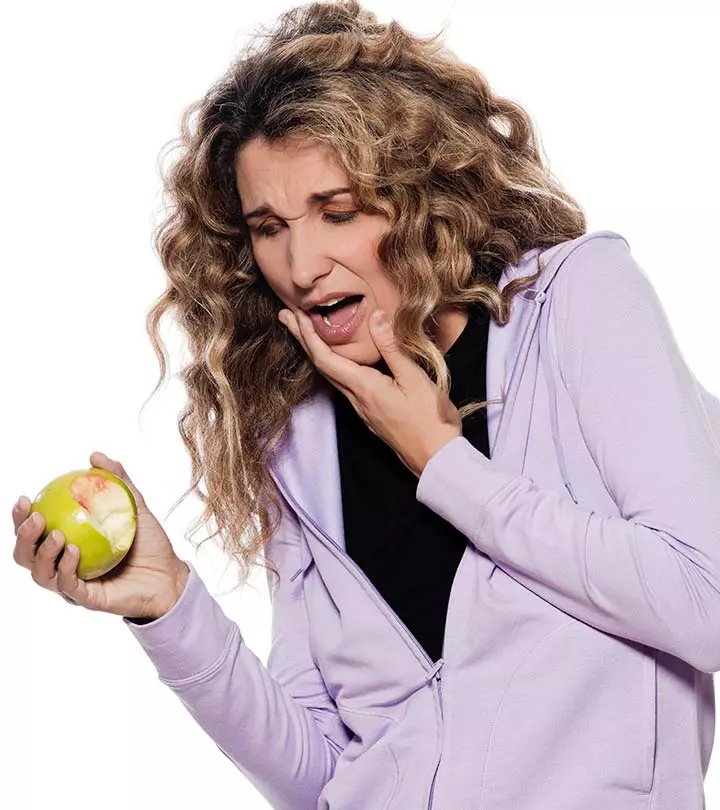
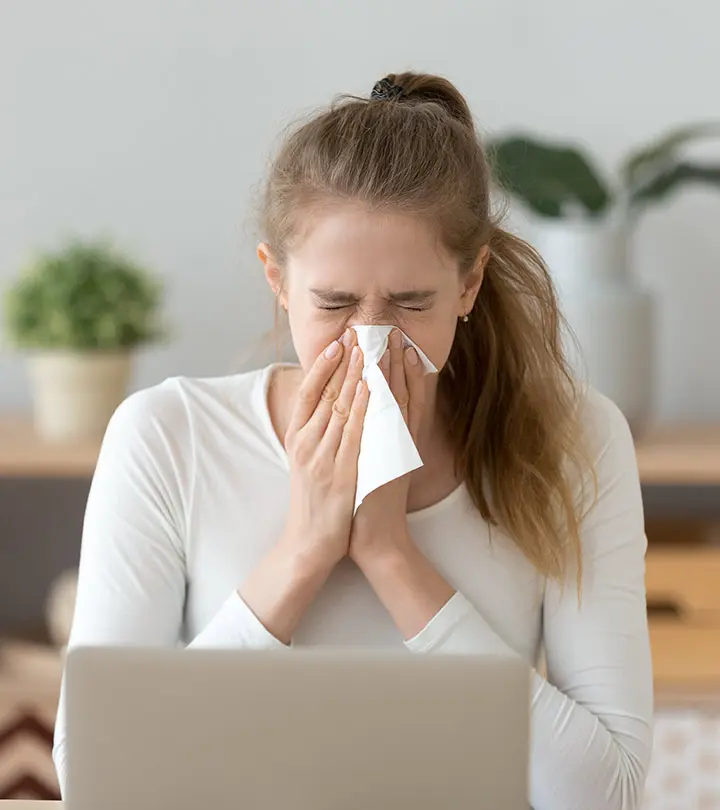

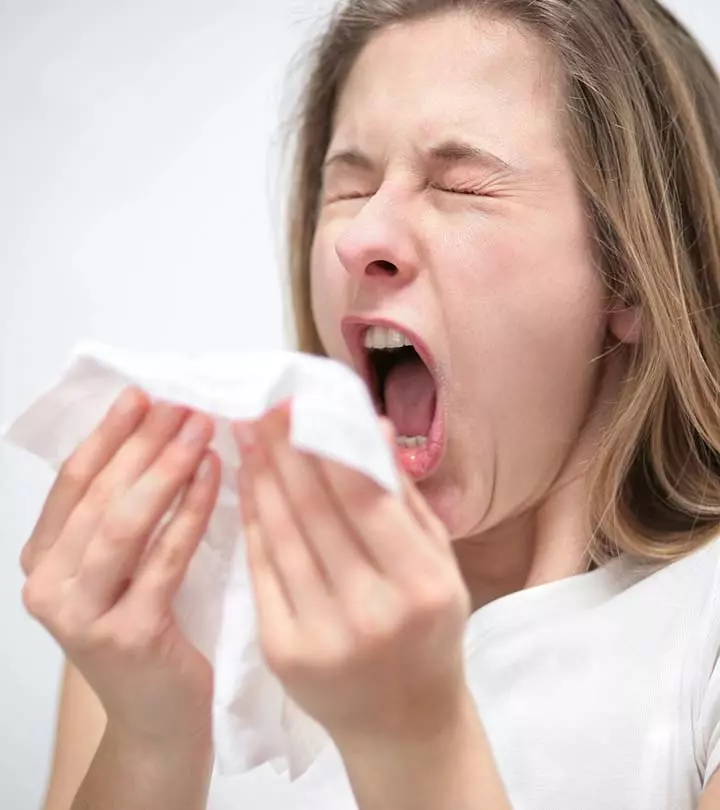

Community Experiences
Join the conversation and become a part of our empowering community! Share your stories, experiences, and insights to connect with other beauty, lifestyle, and health enthusiasts.